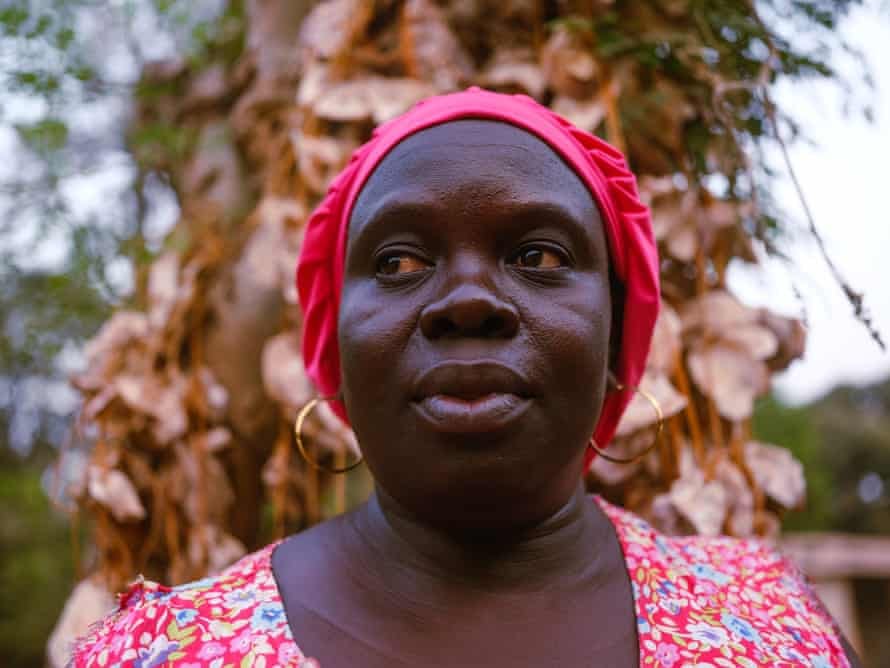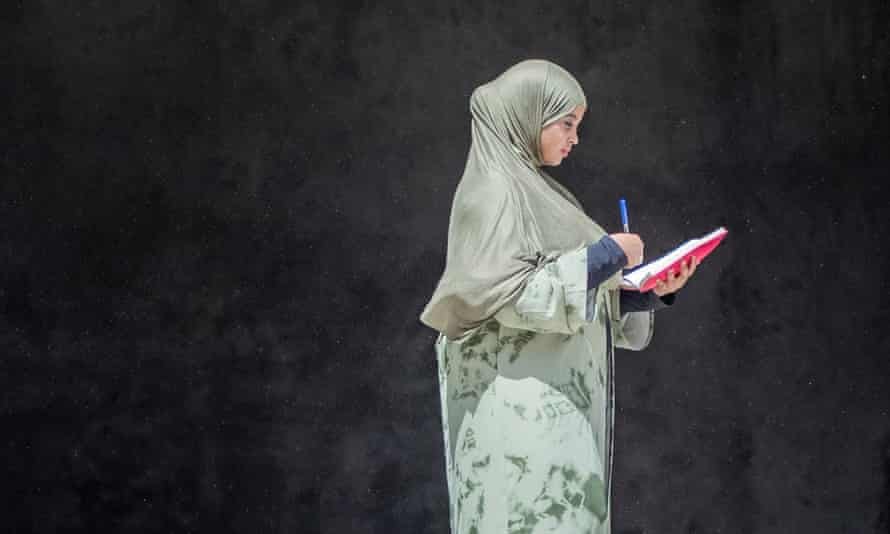Global Roundup: Sabina Nessa and GBV in the UK, LGBTQ+ Advocates vs Texas Anti-Trans Sports Bill, Senegal Ecofeminst, Women Poets in Somalia, Support for Malaysian Vulva Flower Campaign
Compiled by Samiha Hossain
Nessa, a 28-year-old primary school teacher, was killed on the evening of September 17 while walking in a London park [Metropolitan Police via AP]
CW: gender-based violence
Sabina Nessa, a primary school teacher, was murdered a week ago while walking in Cator Park in Kidbrooke, an area in London. She was on her way to meet a friend at a bar less than a 10-minute walk away from her home when she was attacked. Her body was found by police officers in Cator Park the following afternoon. A man is in custody on suspicion of the murder and police have released images of another man they wish to speak to in connection to the case.
Nessa’s murder has reignited the UK’s conversation on women’s safety and the inaction surrounding violence against women, six months after Sarah Everard was killed by a police officer. Advocates are calling it an “epidemic of violence towards women in the UK.” So far this year, at least 108 women in the UK have been killed by men, or in instances where a man is the principal suspect, according to Counting Dead Women. Many are also calling to attention that solutions proposed by the government are reactive rather than questioning masculinity and society’s role in perpetuating this violence.
We must not risk viewing these murders as isolated incidents. Violence against women is so deeply normalised that women must constantly carry out personal safety work – assessing our surroundings, researching the safest route, carrying keys in our hands and sharing our location with friends. We need an approach that addresses the root causes of male violence against women and the attitudes that minimise and tolerate abuse. - Andrea Simon, director of the End Violence Against Women Coalition (EVAW)
In an essay in Open Democracy, Anita Mureithi highlights the race aspect of Nessa’s murder. Mureithi used social media analytics tool Crowdtangle and found that in the first week after Everard’s death, there were twice as many posts on Facebook as there have been since Nessa died. And 50% more interactions with those posts: while 225,000 people reacted to a post about Everard in the seven days immediately after her death, only 148,000 have responded to the news of Nessa’s death. More news organizations also covered Everard’s case compared to Nessa’s.
Some might ask, why bring race into it? The answer is that, while the wider issue is the epidemic of violence against women, it intersects with race in a way that women of colour are all too familiar with… It’s not a competition, and it’s not about whataboutisms. But the insidious minimisation of violence against women of colour can’t be ignored. Stories of women of colour are often unheard and unreported. - Anita Mureithi
Mureithi notes that it is critical to address the pattern of discrimination in the way that the media, police, and the legal system treat victims of colour. She also mentions the “Missing white woman syndrome,” which refers to mainstream media’s fascination with reporting on missing or endangered young white women and girls from middle-class backgrounds, while women and girls from other marginalized communities are ignored.
Women don’t need protection. Men, the people statistically committing the most crimes against women, need to unlearn toxic narratives that are entrenched in hegemonic masculinity. - Anita Mureithi
Ultimately, meaningful change can only happen when we move beyond narratives of safety and prevention and tackle the root causes of violence against women such as misogyny and white supremacy and how all these aspects work together to keep women in fear.
Photo Equality Texas
Earlier this week, advocacy group Equality Texas led a boycott of Senate Bill 3, which would ban trans student athletes from competing on teams that align with their gender in schools. Activists rallied outside the Texas senate chanting “trans rights are human rights,” and holding signs that read “Let Kids Play” and “Y’all Means All” during a hearing in the chambers.
Advocates switched to this approach after months of testifying against anti-trans legislation with little results. Over 70 bills targeting the LGBTQ+ community have been tabled this year according to Equality Texas, and the vast majority have singled out trans youth. Proposals have ranged from legislation seeking to ban gender-affirming medical care to attempting to prevent trans people from changing the gender marker on their birth certificates. One also threatened to remove trans children from their homes if their parents allowed them to transition.
Equality Texas CEO Ricardo Martinez says that being forced to testify repeatedly is causing trauma for trans youth and their parents, especially with the inappropriate lines of questioning by lawmakers.
Numbness, detachment, anxiety, fear, sadness, restlessness, and despair have been commonly experienced by LGBTQ+ community members who have testified during this year’s Senate hearings. - Ricardo Martinez
Martinez hopes that this rally is a way to empower LGBTQ+ activist and show trans youth that activists will never stop fighting for them.
Mariama Sonko, an ecofeminist in southern Senegal, works with communities to promote women’s role in sustainable agriculture. Photograph: Ricci Shryock
Mariama Sonko is a 52-year-old woman in Senegal who is the head of Nous Sommes la Solution (NSS, We are the Solution), an ecofeminist movement of more than 500 rural women’s associations in Senegal, Ghana, Burkina Faso, the Gambia, Guinea-Bissau, Guinea and Mali. The movement promotes sustainable agroecology and fights large-scale industrial farming.
We promote agroecology and food sovereignty in Africa. Women are invaluable actors for the development of the rural areas. We want to valorise this tireless work of women who are concerned about the environment and the health of their families. They have always worked in agriculture, and they do not use the products that ruin the ecosystem nor the health of humans. - Mariama Sonko
Sonko wants to change the attitudes surrounding women’s role in protecting the environment. NSS promotes sustainable farming methods, which are often rooted in traditional practices, the knowledge of which is mostly held by women.
Getting to her current position has been a challenge for Sonko. Over a decade ago, she was helping a landowner build a garden on his plot to grow food for him to sell and for the women’s families to eat. Once the trees began to bear fruit, the landowner kicked the women off his land. Sonko was ostracized from her small village community when she tried to push the landowner to change his mind.
Since then, her work has involved many important issues such as helping local organizations run agricultural projects that increase women’s incomes, the production of biofertilizer, which women make from cow dung to use in their fields and sell, and developing an all-natural seasoning product made from local herbs. She also advocates for local production and ecological agriculture as well as equality for women at home.
When I was small, I saw my mother woke up at 5am and went to sleep at 11pm. It’s too much. When I became a mother, I changed that. The women were doing so much housework. When I [married], my husband already had sons. I taught them how to do housework, too. They do it alongside the girls. Things must change, because the [free] time the men have, women should have that time to do things as well. Because what a man can do, a woman can do as well. - Mariama Sonko
Zahra Abdihagi, poet and director of Somali Storytellers. Photograph: Said Fadhaye/UNDP
Jama Abdi is a woman from Somalia who will be one of the judges in a new competition billed as the “Oscars” of Somali poetry – the Somalia Poetry Awards. The contest, which includes a category for woman poet of the year, is an attempt to showcase the vibrant tradition of Somali verse and find new voices to join venerated storytellers of previous generations. The country has a rich history of oral storytelling linked to the politics of the time.
The poem … can be used for many purposes. If women use poems for awareness it can correct all the problems. So in my view, I think it’s worth investing in. I believe it’s one of the best things that can be done. - Jama Abdi
Another of the awards’ judges is Asha Lul, who left Somalia with her family at the start of the civil war in the early 90s and has since been living in the UK. Her collection The Sea-Migrations: Tahriib was critically acclaimed and named poetry book of the year in 2017 by the Sunday Times.
Another woman poet is Sadia Hussein, who lives in a Somali-speaking community across the border in Kenya and uses no-holds-barred verses to campaign against female genital mutilation.
Zahra Abdihagi is a poet and executive director of Somali Storytellers, a community organization. She notes that younger poets often go unacknowledged and hopes this project will bring more age and gender diversity.
Whenever I hear the old voices, it’s always men; I don’t see women represented in [Somali] history or poetry. I do believe there were female poets, but nobody ever really acknowledged them. So now I’m hoping that maybe, since we’re already making history, that women can also be part of that history as well. - Zahra Abdihagi
Libresse Malaysia’s vulva ‘flower’ design on their packaging for sanitary pads drew the ire of religious body YADIM Muslim Women’s Council (MAYA).
The feminine hygiene brand Libresse Malaysia had to retract its advertisement featuring vulva flower designs on their packaging for sanitary pads. The religious body Yadim Muslim Women’s Council described the ads as a “dishonor to women.” They also called it “exploitation of women’s bodies” and said that the promotion undermines the dignity of women, degrades them, and violates the norms of decency in Malaysian society.
Libresse apologized, but Malaysian women took to social media to defend the design choice, saying that female genitalia should not be something to be ashamed of. Activists are also saying that Libresse’s campaign “Know Your V” is a positive initiative that encourages education around personal care and removes the stigma attached to vulvas.
Many are now purchasing Libresse products as an act of protest against Yadim Muslim Women’s Council’s statement and to show their support for the company’s campaign.
The support on social media for the vulva flowers shows that women in Malaysia are not willing to accept age-old narratives that their bodies are something to hide. Vulvas can and should be talked openly about.
Samiha Hossain (she/her) is a student at the University of Ottawa. She has experience working with survivors of sexual violence in her community, as well as conducting research on gender-based violence. A lot of her time is spent learning about and critically engaging with intersectional feminism, transformative justice and disability justice.
Samiha firmly believes in the power of connecting with people and listening to their stories to create solidarity and heal as a community. She refuses to let anyone thwart her imagination when it comes to envisioning a radically different future full of care webs, nurturance and collective liberation.



![Nessa, a 28-year-old primary school teacher, was killed on the evening of September 17 while walking in a London park [Metropolitan Police via AP] Nessa, a 28-year-old primary school teacher, was killed on the evening of September 17 while walking in a London park [Metropolitan Police via AP]](https://substackcdn.com/image/fetch/w_1456,c_limit,f_auto,q_auto:good,fl_progressive:steep/https%3A%2F%2Fbucketeer-e05bbc84-baa3-437e-9518-adb32be77984.s3.amazonaws.com%2Fpublic%2Fimages%2F97ff9041-506f-49e9-b6d1-d6a4313b302e_770x513.jpeg)




Could I suggest active voice when writing on GBV? There's quite a bit written about this and distancing the perpetrators of violence ('Sarah Everard was killed by a police officer' / vs 'a police officer killed Sarah Everard').